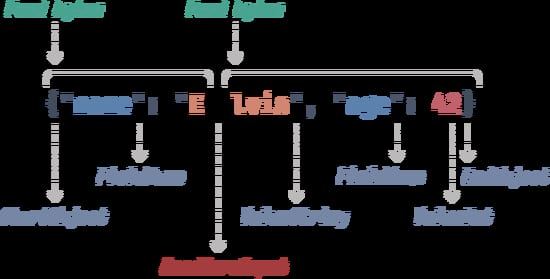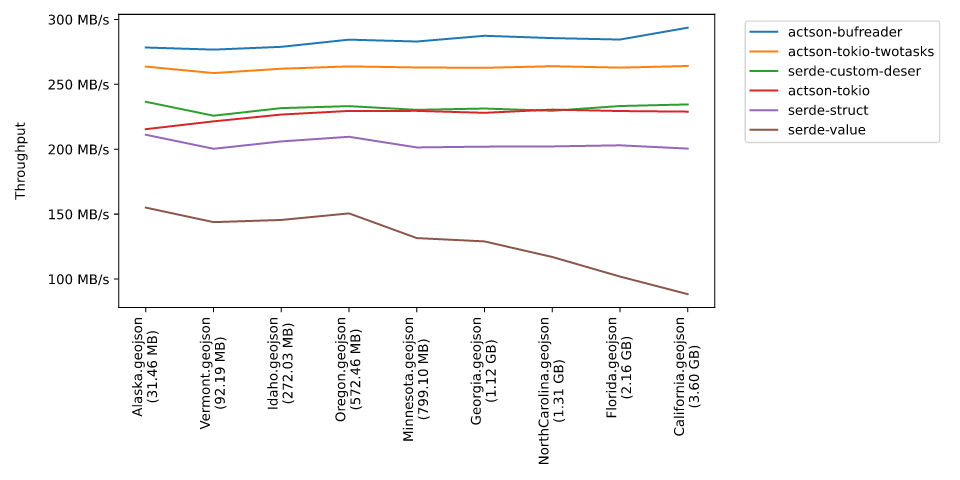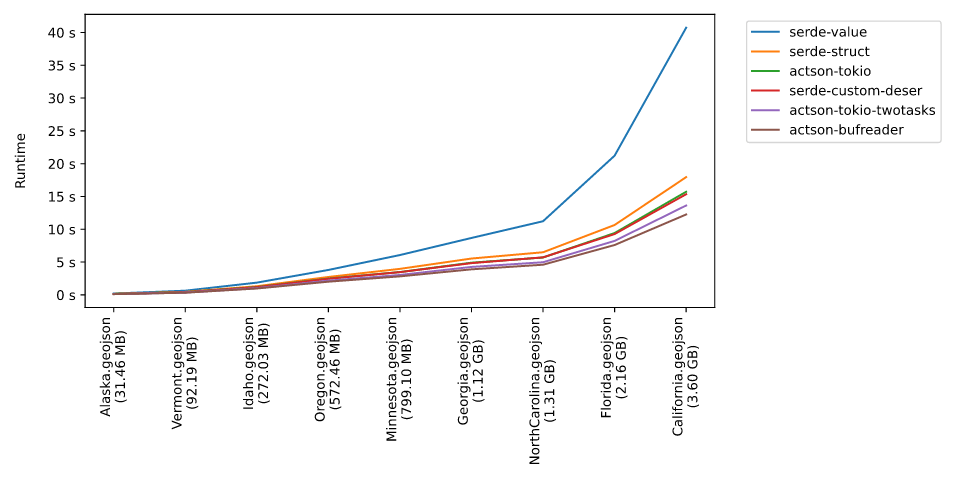9 releases (4 stable)
| 2.0.1 | Feb 26, 2025 |
|---|---|
| 1.1.0 | Jul 25, 2024 |
| 1.0.0 | Mar 13, 2024 |
| 0.5.0 | Feb 25, 2024 |
| 0.3.0 | Jul 26, 2023 |
#140 in Parser implementations
3,936 downloads per month
Used in 3 crates
(2 directly)
1.5MB
1K
SLoC
Actson 



Actson is a low-level JSON parser for reactive applications and non-blocking I/O. It is event-based and can be used in asynchronous code (for example in combination with Tokio).

Why another JSON parser?
- Non-blocking. Reactive applications should use non-blocking I/O so that no thread needs to wait indefinitely for a shared resource to become available (see the Reactive Manifesto). Actson supports this pattern.
- Big Data. Actson can handle arbitrarily large JSON text without having to completely load it into memory. It is very fast and achieves constant parsing throughput (see the Performance section below).
- Event-based. Actson produces events during parsing and can be used for streaming. For example, if you write an HTTP server, you can receive a file and parse it at the same time.
Actson was primarily developed for the GeoJSON support in GeoRocket, a high-performance reactive data store for geospatial files. For this application, we needed a way to parse very large JSON files with varying contents. The files are received through an HTTP server, parsed into JSON events while they are being read from the socket, and indexed into a database at the same time. The whole process runs asynchronously.
If this use case sounds familiar, then Actson might be a good solution for you. Read more about its performance and how it compares to Serde JSON below.
Usage
Push-based parsing
Push-based parsing is the most flexible way of using Actson. Push new bytes
into a PushJsonFeeder and then let the parser consume them until it returns
Some(JsonEvent::NeedMoreInput). Repeat this process until you receive
None, which means the end of the JSON text has been reached. The parser
returns Err if the JSON text is invalid or some other error has occurred.
This approach is very low-level but gives you the freedom to provide new bytes to the parser whenever they are available and to generate JSON events whenever you need them.
use actson::{JsonParser, JsonEvent};
use actson::feeder::{PushJsonFeeder, JsonFeeder};
let json = r#"{"name": "Elvis"}"#.as_bytes();
let feeder = PushJsonFeeder::new();
let mut parser = JsonParser::new(feeder);
let mut i = 0;
while let Some(event) = parser.next_event().unwrap() {
match event {
JsonEvent::NeedMoreInput => {
// feed as many bytes as possible to the parser
i += parser.feeder.push_bytes(&json[i..]);
if i == json.len() {
parser.feeder.done();
}
}
JsonEvent::FieldName => assert!(matches!(parser.current_str(), Ok("name"))),
JsonEvent::ValueString => assert!(matches!(parser.current_str(), Ok("Elvis"))),
_ => {} // there are many other event types you may process here
}
}
Asynchronous parsing with Tokio
Actson can be used with Tokio to parse JSON asynchronously.
The main idea here is to call JsonParser::next_event() in a loop to
parse the JSON document and to produce events. Whenever you get
JsonEvent::NeedMoreInput, call AsyncBufReaderJsonFeeder::fill_buf()
to asynchronously read more bytes from the input and to provide them to
the parser.
[!NOTE] The
tokiofeature has to be enabled for this. It is disabled by default.
use tokio::fs::File;
use tokio::io::{self, AsyncReadExt, BufReader};
use actson::{JsonParser, JsonEvent};
use actson::tokio::AsyncBufReaderJsonFeeder;
#[tokio::main]
async fn main() {
let file = File::open("tests/fixtures/pass1.txt").await.unwrap();
let reader = BufReader::new(file);
let feeder = AsyncBufReaderJsonFeeder::new(reader);
let mut parser = JsonParser::new(feeder);
while let Some(event) = parser.next_event().unwrap() {
match event {
JsonEvent::NeedMoreInput => parser.feeder.fill_buf().await.unwrap(),
_ => {} // do something useful with the event
}
}
}
Parsing from a BufReader
BufReaderJsonFeeder allows you to feed the parser from a std::io::BufReader.
[!NOTE] By following this synchronous and blocking approach, you are missing out on Actson's reactive properties. We recommend using Actson together with Tokio instead to parse JSON asynchronously (see above).
use actson::{JsonParser, JsonEvent};
use actson::feeder::BufReaderJsonFeeder;
use std::fs::File;
use std::io::BufReader;
let file = File::open("tests/fixtures/pass1.txt").unwrap();
let reader = BufReader::new(file);
let feeder = BufReaderJsonFeeder::new(reader);
let mut parser = JsonParser::new(feeder);
while let Some(event) = parser.next_event().unwrap() {
match event {
JsonEvent::NeedMoreInput => parser.feeder.fill_buf().unwrap(),
_ => {} // do something useful with the event
}
}
Parsing a slice of bytes
For convenience, SliceJsonFeeder allows you to feed the parser from a slice
of bytes.
use actson::{JsonParser, JsonEvent};
use actson::feeder::SliceJsonFeeder;
let json = r#"{"name": "Elvis"}"#.as_bytes();
let feeder = SliceJsonFeeder::new(json);
let mut parser = JsonParser::new(feeder);
while let Some(event) = parser.next_event().unwrap() {
match event {
JsonEvent::FieldName => assert!(matches!(parser.current_str(), Ok("name"))),
JsonEvent::ValueString => assert!(matches!(parser.current_str(), Ok("Elvis"))),
_ => {}
}
}
Parsing into a Serde JSON Value
For testing and compatibility reasons, Actson is able to parse a byte slice into a Serde JSON Value.
[!NOTE] You need to enable the
serde_jsonfeature for this.
use actson::serde_json::from_slice;
let json = r#"{"name": "Elvis"}"#.as_bytes();
let value = from_slice(json).unwrap();
assert!(value.is_object());
assert_eq!(value["name"], "Elvis");
However, if you find yourself doing this, you probably don't need the reactive features of Actson and your data seems to completely fit into memory. In this case, you're most likely better off using Serde JSON directly (see the comparison below)
Parsing in streaming mode (multiple top-level JSON values)
If you want to parse a stream of multiple top-level JSON values, you can enable
streaming mode. Values must be clearly separable. They must either be
self-delineating values (i.e. arrays, objects, strings) or keywords (i.e.
true, false, null), or they must be separated either by white space, at
least one self-delineating value, or at least one keyword.
Example streams
1 2 3 true 4 5
[1,2,3][4,5,6]{"key": "value"} 7 8 9
"a""b"[1, 2, 3] {"key": "value"}
Example
use actson::feeder::SliceJsonFeeder;
use actson::options::JsonParserOptionsBuilder;
use actson::{JsonEvent, JsonParser};
let json = r#"1 2""{"key":"value"}
["a","b"]4true"#.as_bytes();
let feeder = SliceJsonFeeder::new(json);
let mut parser = JsonParser::new_with_options(
feeder,
JsonParserOptionsBuilder::default()
.with_streaming(true)
.build(),
);
let mut events = Vec::new();
while let Some(e) = parser.next_event().unwrap() {
events.push(e);
}
assert_eq!(events, vec![
JsonEvent::ValueInt,
JsonEvent::ValueInt,
JsonEvent::ValueString,
JsonEvent::StartObject,
JsonEvent::FieldName,
JsonEvent::ValueString,
JsonEvent::EndObject,
JsonEvent::StartArray,
JsonEvent::ValueString,
JsonEvent::ValueString,
JsonEvent::EndArray,
JsonEvent::ValueInt,
JsonEvent::ValueTrue,
]);
Performance
Actson has been optimized to perform best with large files. It scales linearly, which means it exhibits constant parsing speed and memory consumption regardless of the size of the input JSON text.
The figures below show the parser's throughput and runtime for different GeoJSON input files and in comparison to Serde JSON.
Actson with a BufReader performs best on every file tested (actson-bufreader benchmark). Its throughput stays constant and its runtime only grows linearly with the input size.
The same applies to the other Actson benchmarks using Tokio (actson-tokio and actson-tokio-twotasks). Asynchronous code has a slight overhead, which is mostly compensated for by using two concurrently running Tokio tasks (actson-tokio-twotasks).
The serde-value benchmark shows that the parser's throughput collapses the larger the file becomes. This is because it has to load its entire contents into memory (into a Serde JSON Value). The serde-struct benchmark deserializes the file into a struct that replicates the GeoJSON format. It suffers from the same issue as the serde-value benchmark, namely that the whole file has to be loaded into memory. In this case, the impact on the throughput is not visible in the figure since the custom struct is smaller than Serde JSON's Value and the test system had 36 GB of RAM.
The serde-custom-deser benchmark is the only Serde benchmark whose performance is on par with the slowest asynchronous Actson benchmark actson-tokio (which runs with only one Tokio task). This is because serde-custom-deser uses a custom deserializer, which avoids having to load the whole file into memory (see example on the Serde website). This very specific implementation only works because the structure of the input files is known and the used GeoJSON files are not deeply nested. The solution is not generalizable.
Read more about the individual benchmarks and the test files here.
Throughput (higher is better)

Tested on a MacBook Pro 16" 2023 with an M3 Pro Chip and 36 GB of RAM.
Runtime (lower is better)

Tested on a MacBook Pro 16" 2023 with an M3 Pro Chip and 36 GB of RAM.
Should I use Actson or Serde JSON?
As can be seen from the benchmarks above, Actson performs best with large files. However, if your JSON input files are small (a few KB or maybe 1 or 2 MB), you should probably stick to Serde JSON, which is a rock-solid, battle-tested parser and which will perform extremely fast in this case.
On the other hand, if you require scalability and your input files can be of arbitrary size, or if you want to parse JSON asynchronously, use Actson.
The aim of this section is not to make one parser appear better than the other. Actson and Serde JSON are two very distinct libraries that each have advantages and disadvantages. The following table may help you decide whether you require Actson or if you should prefer Serde JSON:
| Actson | Serde JSON |
|---|---|
| The input files can be of arbitrary size (several GB) | The input files are just a few KB or MB in size |
| The JSON text is streamed, e.g. through a web server | The JSON text is stored on the file system or in memory |
| You want to concurrently read and parse the JSON text | Sequential parsing is sufficient |
| Parsing should not block other tasks in your application (reactive programming) | The JSON text is so small that parsing is quick enough, or your application is not reactive and does not run multiple tasks in parallel |
| You want to process individual JSON events | You prefer convenience and do not care about events |
| The structure of the JSON text can vary or is not known at all | The structure is very well known |
| You don't require deserialization (mapping the JSON text to a struct), or deserialization is impossible due to the varying or unknown structure of the JSON text | You want and can deserialize the JSON text into a struct |
Compliance
We test Actson thoroughly to make sure it is compliant with RFC 8259, can parse valid JSON documents, and rejects invalid ones.
Besides own unit tests, Actson passes the tests from JSON_checker.c and all 283 accept and reject tests from the very comprehensive JSON Parsing Test Suite.
Other languages
Besides this implementation in Rust here, there is a Java implementation.
Acknowledgments
The event-based parser code and the JSON files used for testing are largely based on the file JSON_checker.c and the JSON test suite from JSON.org originally released under this license (basically MIT license).
The directory tests/json_test_suite is a Git submodule pointing to the
JSON Parsing Test Suite curated by
Nicolas Seriot and released under the MIT license.
License
Actson is released under the MIT license. See the LICENSE file for more information.
Dependencies
~0.4–6.5MB
~41K SLoC